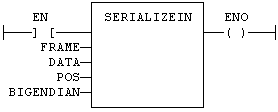
Function - Extract the value of a variable from a binary frame
FRAME :
USINT Source
buffer - must be an array
DATA :
ANY(*) Destination variable to be copied
POS :
DINT Position in the source buffer
BIGENDIAN : BOOL
TRUE if the frame is encoded with Big
Endian format
(*) DATA cannot be a STRING
NEXTPOS : DINT Position in the source buffer after the extracted
data
0 in case or error (invalid position /
buffer size)
This function is commonly used for extracting data from a communication frame in binary format.
In LD language, the operation is executed only if the input rung (EN) is TRUE. The output rung (ENO) keeps the same value as the input rung. This function is not available in IL language.
The FRAME input must fit the input position and data size. If the value cannot be safely extracted, the function returns 0.
The DATA input must be directly connected to a variable, and cannot be a constant or complex expression. This variable will be forced with the extracted value.
The function extracts the following number of bytes from the source frame:
1 byte for BOOL, SINT, USINT and BYTE variables
2 bytes for INT, UINT and WORD variables
4 bytes for DINT, UDINT, DWORD and REAL variables
8 bytes for LINT and LREAL variables
The function cannot be used to serialize STRING variables.
The function returns the position in the source frame, after the extracted data. Thus the return value can be used as a position for the next serialization.
Q := SERIALIZEIN (FRAME, DATA, POS, BIGENDIAN);

(* The function is executed only if EN is
TRUE *)
(* ENO keeps the same value as EN *)

Not available